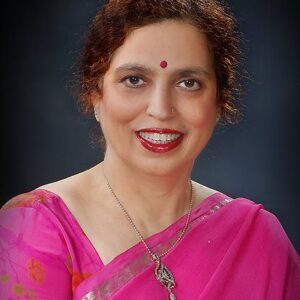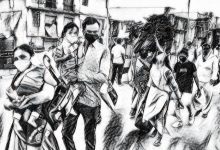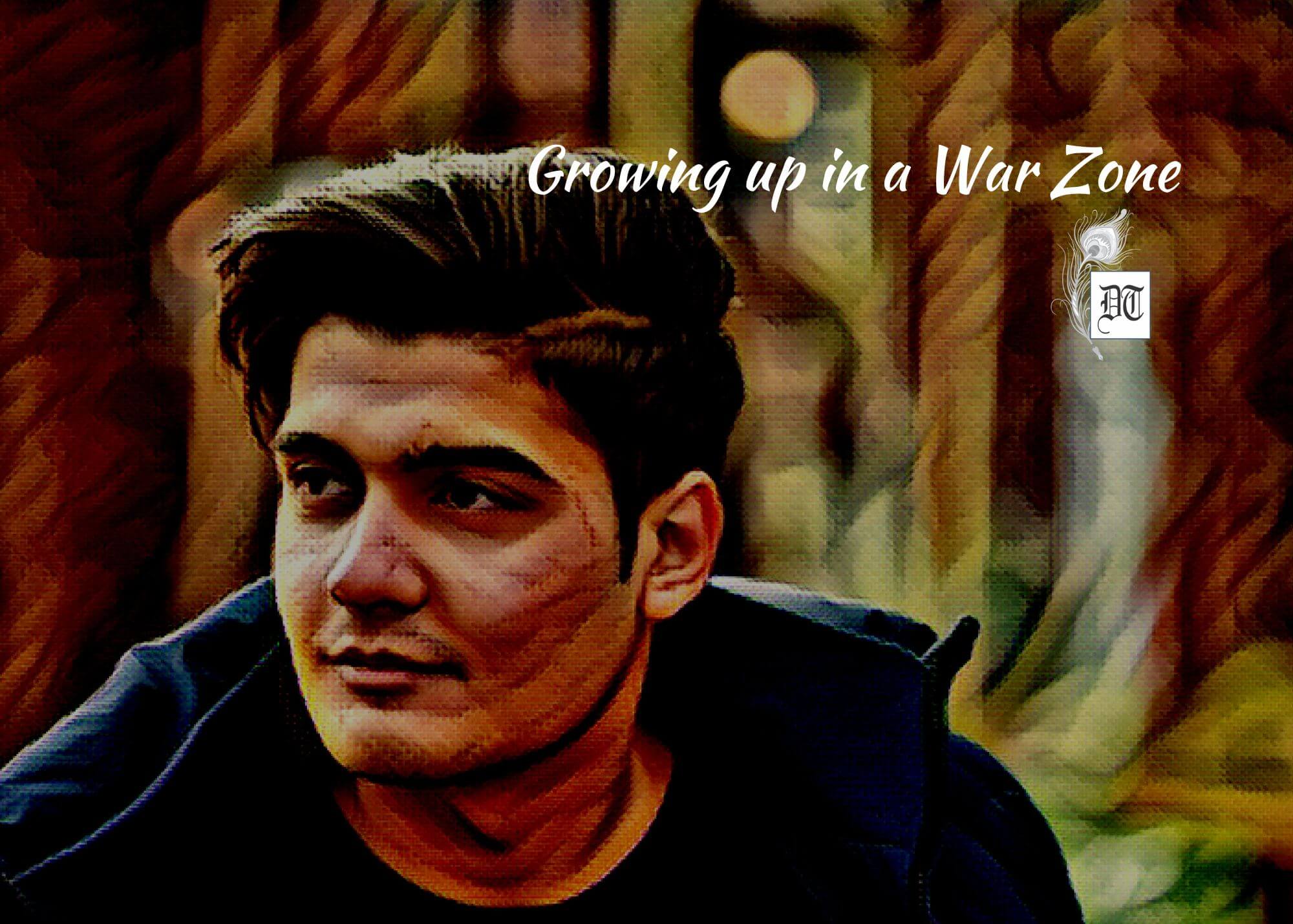The book For the Love of a Man is a heavily fictionalized account of her life that lays bare taboo subjects like female sexuality, exposing what right-thinking people would carry to their graves with sealed lips. The first chapter of this book won a prize amongst 1700 entries for being one of the best 1 st chapters of an unpublished novel in a contest held by oxfordbookstore.com. Here’s a book extract for Amrinder, exclusively for Different Truths.
I would like to tell my dear friends struggling with their fears and phobias, dilemma’s and conflicts that I have dared – dared to put my life on paper. My struggles, shame, sorrow and sexuality have spilled on the pages of an autobiographical book, like blood from a severed artery. Fear squeezed my heart with icy fingers while doubts roasted me alive on a slow fire as I wrote, yet I persevered. There were valiant smiles even as my tongue tasted the salt of my tears; my teeth drew blood from my lip in an attempt to hold back the sobs but I did not give up. Eventually this blood-letting proved cathartic.
You may ask what have I gained from such indecent exposure of an intensely private life? Emotional closure, healing of festering sores, seeping out of bitterness, forgiveness for those who hurt me and those I hurt, to name a few peace-restoring miracles. You may wonder why anyone would be interested in a life as ordinary as mine. Though biographies of great men make worthy reads, lives of people like you and me are the stuff stories are made of. We are the unsung/unheard heroes whose silent struggles, failures and victories remain buried under the mundane. By unearthing one such story, I want you to know that each of us carry our private hells within us. How we deal with it determines, not only our present, our future but colours our memories of the past. All I ask of you is to tread the path I travelled, bear what I have borne, pass through storms that passed through me, live the lives I’ve lived, before you judge me or condemn.
What I have done may not be sanctioned by society or religion, but for me, living a lie was the worst of all sins. I dared to live life on my own terms and if things went horribly awry, I paid the price unflinchingly. At least I have no regrets. Questions like ‘What if I had done things differently?’ ‘What if I had the courage to…?’ do not torture me. My tortures were of a different kind – of commission rather than omission. If I were given a chance to live life all over again, except for one major act of submission, I would not have done a thing differently. Coming to think of it, if I had defied my parents to follow my heart, my life story would not have been the same. That one major ‘if…’ still, haunts me.
This in a nutshell, is the story:
Father, lover, husband, son have let me down one by one.
Each time I fell on life’s terrain, another’s help I sought to gain
Each one jerked his hand away and, heartlessly walked away.
Each time, something within me died, as feelings numbed and crystallized.
Each stab, each wound, each little prick, scarred and hardened into a brick,
That turned my heart into a fort, which could now stand, without support.
I have done with sighs and anguished cries; with love and longing, lust and lies,
After elusive shadows, long I ran, never again, will I crave the love of a man.
From now on, it just my dog and me and a book beneath a shady tree.
Amrita is forced to submit to an arranged marriage though she loves another. As long as she remains the image of glorified femininity, she blends into the background, for that is what Indian womanhood is all about. She grows corns standing on the pedestal and steps down. A few breaths of unfettered air are all she can take before her virtue is irrevocably stained by an unsuitable lover. All too soon the price of illicit love exceeds its pleasures. Her parents condemn her, her sons despise her and her husband tightens the chains of matrimony despite her infidelity.
There are shame and blame and a devouring isolation. In an attempt to retain her sanity, she flees to the Himalayas. In those lofty reaches, she finds a startlingly simple solution to her problems – she has to look inwards for the peace evaded her.
Excerpts: Chapter 1
I was born in Jalandhar jail. Not because my mother was a convict but because her father happened to be the jail doctor and she had gone to her maternal home to deliver. Ever since I was apprised of the fact I’d quip, ‘I only hope I do not die in jail.’ and shudder involuntarily at my morbid witticism.
Besides being born at the wrong place, I belonged to the wrong sex. Under the ancestral haveli (mansion) in Jammu was a small airless room called the kothri. A large bed dominated the dark precincts of this windowless chamber. It used to be the nuptial bed in days gone by, but ever since its magical properties were discovered, it was reserved for lying in. It was a proven fact that every woman who delivered here begot a son.
My father was the first to fly the nest on the wings of the Air Force and hence the retribution of a daughter. My mother felt that she had let the family down. My father joked that as he was away at the time of delivery, a girl was born; only it wasn’t a joke for the next time he made it a point to be with her and was rewarded by a son. My father’s sister sent a congratulatory note stating, ‘What else can we expect from the daughter of a woman who has borne eight daughters?’
Barring the fact that I was born a girl, my parents could not fault me. I had a crop of crisp black curls and big black button eyes. A rosy baby with rosy cheeks and a rosebud mouth had to be called Rosy. People marvelled at the way I rolled up into a ball, and put my thumbs and big toes in my mouth. I retained both habits for I still often put my foot in my mouth. As for the thumb, it stayed in for long enough to spoil the alignment of my teeth.
The only one who did not hold my being a girl against me was Daadaji (paternal grandfather), perhaps because I resembled his dead wife, Ajit Kaur, who died a few months before I was born. The timing of my birth and an uncanny likeness to her led him to believe that she had reincarnated as me! I felt a sense of deja vu each time I crossed the threshold of our haveli in Jammu. The wife who knew no happiness within its confines felt vindicated when treated with love by the same old man as a granddaughter. He was partial to me. If the other grandchildren received a paisa each morning, he would put an anna on was my palm and close my fist quickly lest the others saw. I have fond memories of an old man who wore a white turban like a Hindu though he was a Sikh. He dozed whole day in the garden in front of the house and was hardly spoken to. I thought that this was because he was hard of hearing. Much later I learnt that his children despised him, and he deserved their scorn. He was deaf not because of old age but due to an overdose of opium. This attempt at suicide was because his ‘mistress’ had ditched him for his elder brother!
Daadaji was the typical son of a rich landowner, idle and debauch. Not having done an ounce of work all his life, he sold bits of property to maintain his large family and numerous mistresses. Though his children went hungry to bed, he upheld the tradition of nobility by sending silver plates filled with gold coins to his current favourite’s’s house.
Not that he neglected his duty as a husband. Even as he enjoyed the company of other women, he gave his wife a child each year.
As long as the old man—my great-grandfather—was alive, he’d chip in financially. My father Rajinder, was a strapping young lad and there was a mare, eighteen spans high, he had to have. The horse seller boasted that she had a gait so steady that one could hold a bowl of milk in one hand while riding her and not a drop would spill.
The old man walked around the beautiful beast and inquired, ‘How much?’
‘Rs. 12/-.’
It was a princely sum in those days. Much to Rajinder’s disappointment, the deal was called off. Later, the doting grandparent did buy him a horse, that too for Rs. 18. This was puzzling.
‘You reject an animal costing Rs. 12 and then buy me one for Rs. 18. Not that I am complaining but . . .?’ asked Rajinder.
‘It’s the pocket my dear child, the pocket. When empty, Rs. 12/- is expensive. When full Rs. 18/- is cheap.’
It was a valuable lesson learnt early in life.
During my childhood, trains would go till Pathankot; a bus journey of six hours would take us to Jammu. Curiosity would pry open eyes bleary with sleep. Happily we’d trot alongside our parents, taking in the sights and smells of the city. Never mind if, at that early hour, the pervading smell was of shit. Never mind if the sights that greeted our eyes were those of children squatting over open gutters. Our shoes clipped chopped on the cobbled streets as we giggled at the bottoms exposed through pajamis peculiar to North India. These were tight flannel pyjamas with a hole in the excretory area. In this way the harried mothers kept their children warm and dry without resorting to a repeated change of clothes.
For the adults, there were open latrines on rooftops. These were door-less, roofless enclosures with parallel wooden planks placed a foot apart at a height of about two feet. On these we had to perch and let fall our droppings like birds. The mound of excreta in various shades of brown and yellow kept piling. If you heard footsteps on the stairs, you had to clear your throat to give a warning of occupancy. Along the staircase rose a jasmine creeper with a profusion of flowers. My most abiding memory of Jammu in early childhood was the fragrance of jasmines mingled with the stench of shit.
Living in sanitary cantonment areas, it was impossible to clear my bowels there. I was in my eighth year, old enough to be over the gutter stage, but too young for the adult latrines. I was in mortal fear of falling into the mess. Moreover, I gagged on the smell.
For two days, I enforced constipation upon myself but one could deny nature thus far and no further. On the third day, I waited till the sweeper cleaned the toilets and made Mummy stand on top of the stairs to prevent any inadvertent entry. The formalities complete, I perched precariously on the planks holding onto the wall for support. I hadn’t reckoned with visitors from above. Monkeys pried upon my privacy from the overhanging branch of a tree! I was mortified at being caught with my panties down.
Lohri, in mid-January, marked the beginning of the end of winter. The entire clan gathered around a roaring fire in the centre of the courtyard. There was song and dance, revelry and ribald jokes and gourmet delights. Peanuts and popcorn, rewris, and chivda were offered to the fire god before being consumed by humans. The rich aroma of rice and meat being cooked in clarified butter wafted from the kitchen. Young as I was, I noticed brother flirting outrageously with brother’s wife. I also remember the photograph of a foreign girl with a tall Sikh youth displayed in the drawing room. My uncle had met her when he had gone abroad for higher studies. She had fallen desperately in love with him. Though he enjoyed her attentions, he refused to marry her. She was willing to go to the end of the earth with him. He said Jammu would suffice. One look at the toilets killed her love forever.
With a good-for- nothing father, my dad took over the financial burden of his siblings. It was becoming increasingly difficult to do so as he had his own family to raise. The incorrigible old man added insult to injury by stating that he wanted to remarry, as he was lonely!
‘I cannot arrange the finance and the bride for you,’ fumed Daddy. ‘Especially when I know you that you will leave behind another brood for me to look after.’
On this bitter note, father and son parted forever, for soon after, Daadaji died—unloved, unwanted, reaping the just harvest of what he had sowed. Albeit fleetingly, I was perhaps the only one who mourned his death. He had become a toothless tiger by the time I arrived on the scene. Even if the hush-hush stories I heard about him were true, I was too young to understand them. Moreover, even at that age I judged people by the way they treated me rather than by what the world thought of them.
From pages 233 & 234:
I usually ate a solitary lunch. The children weren’t expected till 4 p.m. and MS did not come home in the afternoons. Even as I contemplated warming last night’s leftovers, the doorbell rang. Raju stood on the threshold, his arms full. The rich aroma of sambar filled the air. I watched him lay the food on the table and latch the door. Predator and prey stood face to face.
‘Where do you stare at me like a lamb at a butcher?’
‘I can’t, I really can’t.’
‘You won’t have to do a thing.’
‘But, butb . . .’ I sought to buy time.
‘We’ll bypass the preliminaries today to break your reserve.’
Such cold-blooded calculations! Yet, left to me, we would never consummate our infidelity.
‘Won’t love do? I love you more than anyone else on earth.
I really do.’
‘I want to possess you completely.’
‘But I’ll never be able to do it,’ I said not vehemently enough.
He manoeuvered me to the bed, sat me down on the edge and arranged two pillows behind me.
‘How thoughtful,’ I thought.
Thoughtful my foot! In one swift motion he pushed me backwards, raised my sari and jackknifed my legs. I was taken completely by surprise. Before I could react, he was standing between my legs trying to stuff his barely tumescent organ in!
‘Contract your vaginal muscles, contract them damn you.’
He urged, and I didn’t know how to do so!
This was ridiculous—the rapist enlisting the help of the raped! Was this what I had staked my honour for? A halfhearted attempt by a half-erect penis! Years of trying to get me laid climaxed into an anticlimax! He hadn’t been able to move me at all. For that matter, he hadn’t moved much himself!
All the manoeuvring and boasting had come to this? It was much too funny for words. We laughed till our stomachs ached and tears ran down our cheeks. We laughed till we could laugh no more. We tried to turn our attention to food, but the dosas had turned limp and soggy reminding us of something similar and we dissolved into laughter once again. In fact, the idlis we ate with sambar and coconut chutney gave us far more satiety than the over-hyped, much-anticipated non-act had given us.







 By
By
 By
By